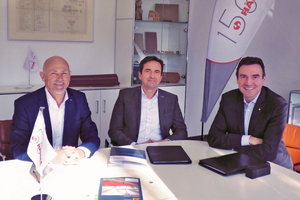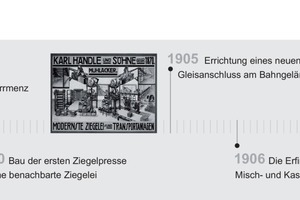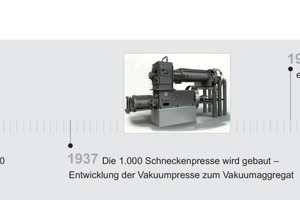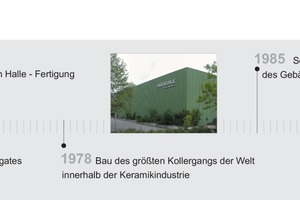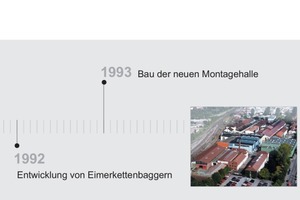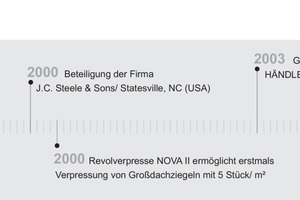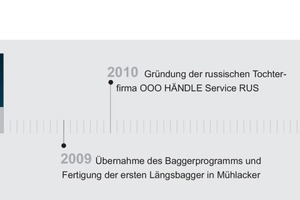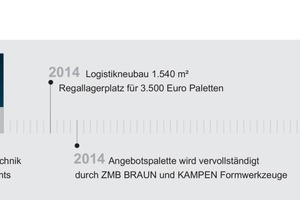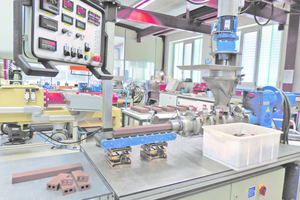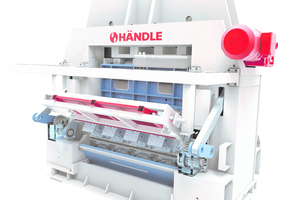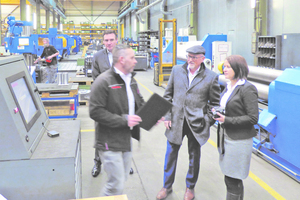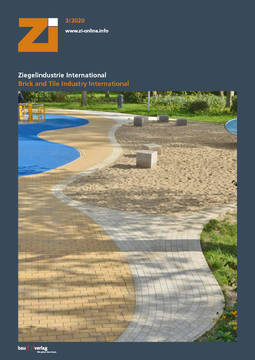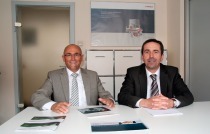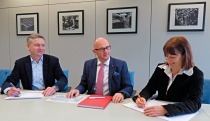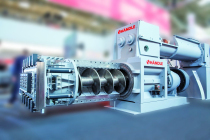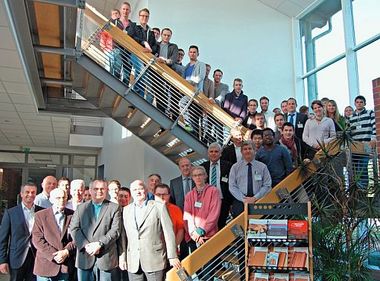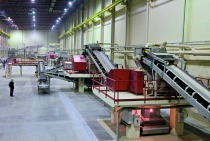150 years in the service of its customers:
preparation and shaping machines from Mühlacker
This year, one of the best-known suppliers to the heavy clay branch is celebrating its 150-year anniversary: Händle GmbH Maschinen und Anlagenbau from Mühlacker. We spoke to Gerhard Fischer, Managing Director; Dietmar Heintel, Head of Sales Service, und Hans-Jörg Walter, Head of Sales Machinery, about the company’s history, present and future.
G. F.: A lot of things, first and foremost the people, of course. We are a family business, and credit our success to our employees who have been committed to Händle over our 150-year company history – in good and not so good times. Our shareholders, who have always supported us, are guarantors for our success. Therefore, together with our shareholders and employees, we shall honour this anniversary fittingly, the official founding date being on June 26. The expertise, the dedication of our team and our aspiration to supply our customers with even better products and services have made us the globally operating company that we are today.
We share a very close and partnership-based cooperation with our worldwide customers and business partners. 150 years of Händle not only means “sold machines”, it also means being there for our customers. We thank all our customers very sincerely for these many years of trust in our products and services.
H.-J. W.: Händle has sold almost 6 000 extruders in total, and these mainly to the ceramics industry, but to other branches, too. A small part of these is made up by our laboratory machines, which are also in service worldwide.
G. F.: Händle has almost 100 years of experience in de-airing extrusion. There is no material and no product in the world that we do not know from our own experience! All our machines are individually designed to meet the specific customer requirements and every machine is produced with its characteristics in line with the specifications in the order. Dimensioning always starts with tests in our laboratory. Here we have build up a unique know-how over many years, on which we can rely even with difficult tasks. I think that is really unique in this industry.
A second strength is the extremely long life of our machines. In some cases, we are servicing machines that are older than 50 years. A key feature of our products are their low maintenance requirement even when they are run at maximum capacity.
Saving energy is another constant focus at Händle. For steady optimization, we offer our customers, for example, permanent logging of operational data.
Our de-airing extrusion units feature optimum vacuum tightness of the entire system. On account of the threadless wear-part fixation of the barrel and liner, they are also easy to maintain. Optimum auger geometry ensures a steady advance of the clay column. Our range of de-airing extruders spans barrel diameters from 80 to 750 mm and can be used for pressures from 100 to a maximum of 150 bar in individual cases.
D. H.: The added value for our customers comprises the following aspects: Our practice-oriented application laboratory is an integral part of Händle as service feature and for project support.
Our highly qualified development and design department can build on many years of experience and is not only engaged in the design of new machines. Process optimization, wear minimization and the reduction of energy consumption are, of course, all part of the work.
Our customer-oriented project management philosophy characterized by fast, accurate attention to the customer’s specific needs all the way from the initial consultations and on-the-ground problem solving to the actual commissioning of machines and systems – plus after-sales service, of course – for the life of the machine.
Händle stands for a global service response and personal on-the-ground customer support for guaranteed fast delivery of spare and wear parts, regeneration service, preventive maintenance and overhauling of used machines. As Gerhard Fischer already mentioned, we are still looking after machines that have been running for more than 50 years, and for these we offer flexible and fast fabrication of parts.
Of course, our company also stands for reliable adherence to planning, engineering and installation timelines for all types of projects in preparation and shaping – and that all over the world.
G. F.: We are very grateful to be part of the Steele Group and to have in Steele a majority shareholder that understands the business and operates a brick company itself within its family.
Steele is a typical family business that from the beginning was, and still is today, interested in long-term collaboration with Händle, and not only in it for short-term success. This year we are celebrating not only 150 years of Händle, but these 20 years of very successful collaboration. In this time, with those responsible at Steele, especially with John und David Steele, very close cooperation has evolved on the basis of the highest trust. And this has been seamlessly continued with the current management generation. Marian Clark and Mac Steele have learned their business from the bottom up. Mac worked more than two years here at Händle in Mühlacker and got to know the German language and our culture.
We also maintain intensive and good cooperation with our co-subsidiary Direxa, especially in the development of new areas of business. Our customers in the USA, South America, and Australia profit considerably with Steele’s bases from an optimized storage of parts, enabling their faster supply with replacement and wear parts. New developments of our machines and services can be realized faster and more easily thanks to know-how transfer within the Steele Group.
H.-J. W.: For us, basic raw material and extrusion tests are an indispensable foundation for the successful realization of projects.
At the beginning of the overall production process, in preparation and shaping, the preconditions for the quality of the finished products are created. If something is not done properly here, it is no longer possible to correct the consequences in the later course of production, that is there are irreversible processes and results.
We do not sell an extruder without knowing the essential rheological properties and operating parameters. This includes, for example, the flow limit and the wall slip properties, the pressing moisture, the maximum pressure and the maximum torque for a defined degree of deformation.
D. H.: Besides completing daily laboratory work with great care, our team naturally works on advanced aspects as a basis for future projects. Here we are looking for answers to the following questions:
How we can contribute to savings in times of increasing energy costs for preparation and shaping?
How can machine maintenance be further optimized?
How can we produce high-quality brick products in future despite poorer-quality and scarcer resources
Are today’s simulation methods suitable to realistically reproduce the flow processes in extruders, including those in the pressure head and die?
G. F.: When in the early 2000s we developed the new Nova II together with Manfred Bracht from Nibra, the focus was on large-format roofing tiles with just five tiles per square metre. This new development was protected as part of a contract for many years by the customer. Then from 2007 came the big crisis and as a consequence there was hardly any demand for new presses with high pressing capacity.
In the meantime, roofing tiles sizes have evened out in the range of 8 to 12 tiles/m², with a high throughput rate. Following an extensive market analysis, in 2016 we took the decision to cover the current and future demand for roofing tile presses with the development of the Nova II to the new Nova III. Besides the larger drum width of 2 400 mm, a structure-optimized machine frame for maximized stiffness, especially against higher lateral forces, is a key factor in comparison with existing designs. Other features of the new press are:
mechanical pressure generation with eccentric cams for up to 400 t pressing force
electrically coupled individual as well as parallel adjustment of the upper die
exact cutting out of the tiles with electromechanically (servocylinders) positioned suction heads
a very stiff drum for simultaneous pressing of up to four large-format tiles
a high-quality cross-section during cutting out of the tiles
H.-J. W.: The response that we have received for our new Nova III 2400 is a positive one. We have already sold five roofing tile presses, three of these are already up and running and two are to be delivered in early 2021. We have already reached an encouraging stage in talks with other customers.
But we have not only further or redeveloped roofing tile presses for flat roofing tiles. For accessory tiles, in 2021 a completely new, modern machine will be available with which today’s and future requirements can be optimally met.
G. F.: Naturally, there is close interaction between the development areas for optimum design of the shaping process. Both die engineer and machine engineer profit considerably from the respective experience of the other. In this cooperation we can offer our customers an integrated approach for resolution of all shaping and process problems, with involvement of the Händle laboratory. Our new developments are driven forwards and brought to market maturity by the joint development group “Shaping”, which is made up of employees from Händle and ZMB Braun. To conclude, I can underscore today that it was absolutely the right decision to integrate ZMB Braun and August Kampen into the Händle Group.
D. H.: In the service division for preparation and shaping, we support customers from one source in the team Händle-Braun-Kampen (H B K). There is another central point of contact for wear optimization and regeneration of wear parts in the Bad Salzuflen region.
G. F.: Even if our machines are not the main energy consumer in a brick and tile plant, we take the topic of energy reduction very seriously. Therefore, we are in future going with completely new drive concepts for our machines and will present these at ceramitec 2021. With the selective further development of the individual and various machines and components, better efficiency will be achieved, and less energy consumed in future.
An important topic in brick and tile production is the moisture content necessary for pressing. Every percent of water has to be dried out again, and water is also a valuable resource. In this field we certainly see more potential for development in the cooperation with Steele, a company with a great deal of experience in stiff pressing, and also with the support of our laboratory, which has extensive know-how concerning plasticity, we are working here on concepts to press products with lower moisture content.
D. H.: Another opportunity is optimized wear protection, from this results lower friction and, consequently, lower energy demand.
H.-J. W.: And the optimum design and linking of the various machines and plant components lead to increased efficiency and therefore to a specific energy saving and better overall efficiency.
D. H.: We have further extended inspection and maintenance agreements, and this has been very well accepted by our customers. Last year, our team completed more than 40 deployments for preventative maintenance worldwide. Our most experienced field fitters are assigned to these tasks and channel their entire know-how into this service.
For the projects Service Tool and Remote Maintenance, we have been able to acquire the first customers, the results so far are certainly positive. After further series of tests we should like to include these services into our portfolio by the end of 2020.
G. F.: Particularly because production processes are becoming increasingly complex and difficult, companies need increasingly qualified professionals, and these are difficult to find on the market. That is why we at Händle continue to focus on solid training as a successful form of recruiting new talent. That is very important especially for us as here in Mühlacker we have to compete with the strongly engineer-driven regions around Stuttgart and Karlsruhe.
To promote the development of upcoming engineers, Händle cooperates with the renowned University of Pforzheim and the Dual Universities (DHBW) in Karlsruhe and Stuttgart. And, we support the Zi student excursion regularly as partners. Here we present ourselves to students from Höhr-Grenzhausen and Nuremberg as a potential employer or perhaps also as a future partner as these graduates may also go into brick and tile plants.
In addition, we have begun in good time with the transfer of the know-how of long-serving key employees into generally available company know-how. We, too, are faced with the challenge of replacing the baby boomer generation with qualified successors in good time, here we are implementing dedicated personnel concepts. Of course, Händle today is and will remain in future an interesting and attractive employer in the region. Trust and dependability, which are reflected in our family-oriented ideals, are highly appreciated by our employees.
G. F. Together with my team, I should like to advance our company so far in the next few years so that all successor arrangements work well. One of the biggest challenges will be to find or build up good personnel to take over this responsibility. This applies not only to Händle, but the entire Steele family. Here, I am very optimistic that we will succeed in this.
We live in very fast-paced times. The Corona crisis, the impact of which has certainly surprised and affected everyone, is currently confronting us with completely new challenges. In our company alliance, we shall rise to the challenge. True to our motto: “We are there for our customers”, we have introduced a large number of measures to secure our processes and provide service for our customers. All contact persons within the Händle Group remain on hand for our customers, our different production sites are working in new working hour models to comply with contact rules. So we can ensure the supply to our customers around the world, providing there are no other regulations from authorities to the contrary.
For 150 years, Händle has stood for long-term orientation, trust and reliability. These are our founding values and nothing about that will change during and after the Corona crisis.
The interview was conducted by Zi Editor Anett Hümmer.
Händle GmbH Maschinen und Anlagenbau
www.haendle.com

